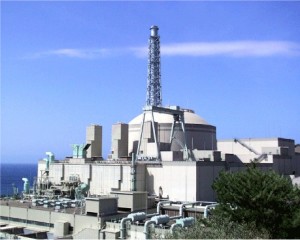Monju May Face End
On Wednesday, September 21, Japan's Chief Cabinet Secretary Yoshihide Suga announced that the nation would undertake a thorough review of the Monju fast-reactor project. Nikkei Asian Review quoted Suga as saying that the government "will fundamentally review it by the end of the year, including (the option of) scrapping it." Thus, it would appear that Monju may finally be facing the final curtain as a working project - although it has not operated in some time.
When conceived, the Monju fast reactor was part of an overall national nuclear energy and technology plan in Japan that was directed at maximizing the use of nuclear fuel in light water reactors (which were to dot the nation providing a large percentage of electric power) and in fast reactors which would burn the waste from the light-water reactors, and also breed new fuel. The amount of high-level waste that was to be stored permanently (used nuclear fuel) under such a scheme, was to be vastly reduced. The utilization of precious nuclear fuel by Japan, which has to import all fuels of all kinds, would be ideally maximized under such a plan. Monju, a fast reactor following the smaller Joyo and built with that experience in view, was the major experimental step before commercial fast reactors were to be designed and constructed.
Monju is a 280 MWt loop type sodium cooled reactor, designed to test plutonium breeding using mixed oxide U-Pu fuel. Authorization to build the project, which is located in Fukui Prefecture, was obtained in 1983. The full scale construction work began, according to the plant's operator, the Japan Atomic Energy Agency, in 1985. The reactor was first made critical in 1994, but a 1995 sodium coolant leak led to an exceedingly protracted shutdown period lasting many years. According to Kyodo News, the reactor has only operated a total of 250 days. Following the Fukushima Daiichi accident, the plant has not been operated.
Further problems plagued the project as it became evident that a large number of safety inspections were invalid. These issues forced the Nuclear Regulation Authority to attempt to change operation of the facility from the Japan Atomic Energy Agency (JAEA) to another operator - but none was found to take the plant over.
According to Kyodo News, the Japanese government has so far spent about $9.8 billion on the Monju project, but it will take another $5.7 billion and perhaps ten years to get the plant up to the post-Fukushima safety standards required by the Nuclear Regulation Authority. The JAEA shows an annual maintenance budget for the plant, non-operational with no modification work being performed, of about $222 million including labor.
Even if Monju is abandoned, Reuters has reported that at least one expert feels that Japan's goal of an idealized, closed fuel cycle is not in as much jeopardy as one might assume. Reuters reported on Wednesday that the older Joyo fast reactor experiment can still be used, and that Japan continues joint research with French interests that may yet see a fast breeder built in France. Quoting Tomoko Murakami, the nuclear energy manager at the Institute of Energy Economics, Reuters wrote "the move will not have an impact on nuclear fuel balance or nuclear fuel cycle technology development or Japan's international cooperation."
Official government sources quoted by Reuters and others have stated that the review can be expected to be complete by the end of the year - and only then will we know the fate of what was once, roughly three decades ago, a shining hope for advancing nuclear technology and for closing the fuel cycle in Japan.
Will Davis is Communications Director and board member for the N/S Savannah Association, Inc. He is a consultant to the Global America Business Institute, a contributing author for Fuel Cycle Week, and he writes his own popular blog Atomic Power Review. Davis is also a consultant and writer for the American Nuclear Society, and serves on the ANS Communications Committee and on the Book Publishing Committee. He is a former US Navy reactor operator and served on SSBN-641, USS Simon Bolivar.


